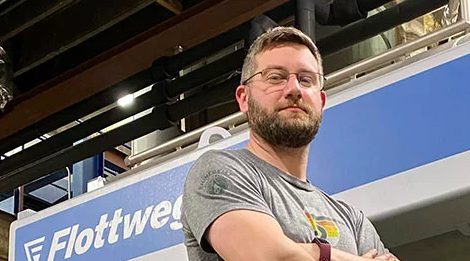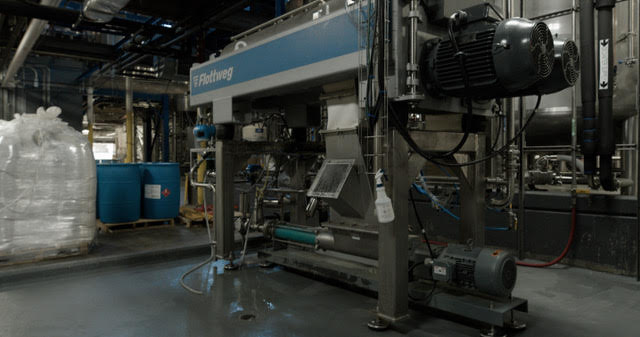With the need for increased efficiency, and capacity, the historic Rhinegeist Brewery made a critical switch in 2016 from lenticular filtration and a small centrifuge to a larger, more robust Flottweg centrifuge. The switch in separation technologies immediately helped the brewery run faster and smoother and with larger quantities.

“We are always growing and always expanding, so we must have technologies that allow us to keep up with the demand,” said Rhinegeist Operations Manager Cole Hackbarth. “With the centrifuge, you can run a lot more beer a lot faster than with traditional filters. It’s been a lot smoother and a lot easier.”
The Cincinnati facility holds about thirty 240-barrel fermenting vessels, eight brite beer tanks (where beer is stored after it’s processed), and a small JV deck (which is like a micro-brewery). The main brew house runs 60-barrel batches.
In 2016, production had simply outgrown the centrifuge that Rhinegeist was using. The brewery processes 80,000 barrels annually with 97 unique brands.
“We needed a faster unit,” Hackbarth said. “We were previously using a filter press and decided to make the move to a centrifuge, mostly for the speed and efficiency. The centrifuge is great at removing all the big materials. With a filter, you have a set media depth that hits a certain particulate level. With the centrifuge, you can run it faster or slower and get whatever you want.”
After fermentation, the beer goes through the Flottweg centrifuge to pull out all of the hop material, and all the yeast. “This creates a nice clean beer ready for packaging,” Hackbarth said. “The service and support availability coupled with the quieter design pushed us to select the Flottweg AC2000. The install was done in less than a week, and then we were separating beer. Over the following month, we dialed in the recipes between beers and ciders to maximize yield and clarity.”

How it Works
When it comes to filtering beer, breweries are often faced with the challenge of a significant yeast load still contained in the beer to be filtered. A high proportion of yeast is bound to limit the service life during kieselguhr (also known as diatomaceous earth) filtration. The separator removes a large proportion of the yeast from the beer continuously even before filtration. This optimizes the associated working processes in the filter basement significantly.
The filter service life is extended by up to 100%. At the same time, the required amount of kieselguhr is reduced, as is the associated work. In addition to the filter service life being extended, beer evaporation and brewery wastewater costs are also reduced. Separators are essential for operating kieselguhr-free filtration systems (diaphragm technology, depth filtration) economically.
Using separators offers advantages for turbidity adjustment as well, in particular with wheat beer. The continuous operating method of the separator ensures an even beer quality. The brewery specifies the required turbidity adjustment in the finished wheat beer, and the control monitors the yeast concentration by measuring the turbidity in the inflow and outflow. The throughflows in the machine are adjusted accordingly, as is the required separation degree. As a result, the beer emerging continuously from the separator has the same turbidity.
The separator ensures constant conditions in the green beer clarification. Setting the required yeast cell counts in the green beer using the separator standardizes the maturation and post-fermentation procedures. This creates defined process conditions and makes for uniform fermentation.
Flottweg clarifier separators are used for separating solids from liquids, thereby permitting highly efficient clarification. The product to be clarified runs through a stationary infeed pipe into the interior of the bowl and is gently accelerated by the distributor to the full speed of rotation. The disc stack in the bowl causes the product stream to be divided into many thin layers, creating a large surface area.
The solid is separated from the liquid within the disc stack. The high centrifugal force makes the solids that are separated out collect at the edge of the bowl. A hydraulic system in the base of the bowl periodically ejects the separated-out solid at full speed of rotation. The clarified liquid flows out of the disc stack into the impeller, which discharges the liquid under pressure.
A hydro-hermetic seal in clarifier separators makes it possible to seal the product space off from the surrounding atmosphere. As a result, this configuration avoids unwanted oxygen absorption and foaming. The hydro-hermetic configuration comprises a stationary disc that is immersed in a liquid (e.g. degassed water), thus creating an exclusion from the surroundings.
Solids are emptied from a Flottweg separator using a Flottweg Soft Shot® discharge system. This system enables extremely quiet self-emptying of the separator bowl.
The operator can check the EBC (unit of measurement for turbidity) at any time to make sure it is within specification. If it’s hazy, the system can re-route and send the liquid back through until the end goal is achieved. When the system confirms the correct EBC, it sends the liquid back through the discharge pipe and the operator can collect a sample that can be quality checked. The separated liquid makes its way through the discharge lines, which flow directly into the tanks. This is the part of the process that prepares the product for shipping.
Centrifuges can run a much larger volume of beer than the more traditional methods of filtration. “They can also handle solids and varying turbidity levels better,” Hackbarth said. “There are no expensive consumables to change out with every run.”
For more information on using centrifuges for beer production, follow this link.
 High quality with increased efficiency
High quality with increased efficiency
Mechanical separation technology for the beverage industry – Beer brewers, winemakers, baristas, the list goes on – all want their drinks to be tasty. Every beverage manufacturer faces the same challenges, no matter what kind of beverage you have – be it beer or wine, coffee or tea. Flottweg is known for our reliability, flexibility, and individuality, and these qualities mean we are always at your side. Every day, our experienced specialists work on designing the best possible systems and solutions for our customers in the beverage industry. Combining “Made in Germany” value with high standards of hygiene and perfect product quality, we guarantee greater efficiency for your process.[/two_third_last]
